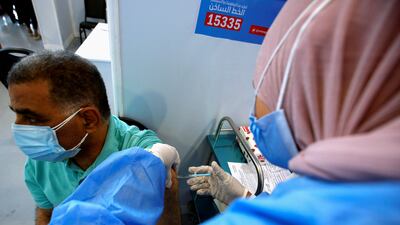Egypt detected its first case of the Delta Covid-19 variant in July, Health Minister Hala Zayed announced at a press conference on Monday.
The first known case in the country was a 35-year-old Egyptian woman who showed “very mild” symptoms and did not require admission to hospital, the minister said.
Ms Zayed added that other cases of the highly contagious variant — detected in 148 countries worldwide —have recently been detected in Egypt but also did not require admission to hospital.
The country of 100 million has been scaling up its vaccination programme and seeking additional doses, as the ministry warns of a coming fourth wave.
“As long as the numbers are constantly increasing, that means we are entering into a new wave. This is an alarm bell,” Ms Zayed said. “It was expected that we will enter a fourth wave by the end of September.”
The Delta variant was detected in 15 countries in the region as of last month and health officials said it would soon be on Egypt's doorstep.
After declining over much of the summer, Covid infections have been on the rise in Egypt since the end of July. The Health Ministry reported 184 new cases and eight deaths on Sunday.
Egypt has registered a total of 286,352 Covid-19 cases, including 16,671 deaths, although the actual number is probably far higher due to the exclusion of private laboratory results from the figures and limited testing.
Meanwhile, only about 3.2 per cent of the population has been fully vaccinated.
Ten million people have registered on the government’s vaccination website since it was launched in late February, and 7.5 million have had at least one dose, Ms Zayed said.
“Registration has slowed,” she said. “We urge citizens to register for the vaccine, especially those who will be required by their work to get vaccinated.”
The Egyptian government recently announced that vaccinations will be mandatory for government employees, university students and staff at educational institutions by October.
Ms Zayed said Egypt will start administering the first one million shots of locally produced Sinovac vaccines on Tuesday.
About 15 million doses have been manufactured since state-owned vaccine maker Vacsera began production in July.
“The Sinovac produced by Vacsera is 100 per cent the same as the Sinovac produced in China,” she said. “The Egyptian public should be proud of this achievement.”
In addition to Sinovac, Sinopharm, AstraZeneca, Sputnik and Johnson & Johnson are now available in Egypt.
About five million doses of Pfizer and Moderna vaccines are scheduled to arrive next month, Ms Zayed said.
She emphasised that all of the vaccines available in Egypt are “safe and approved by the World Health Organisation”, addressing the complaint that some countries refuse to accept certain vaccines for travel.
The Johnson & Johnson vaccine in Egypt has been reserved for those who need vaccinations to travel for work, study or medical treatment, but not tourism.
AstraZeneca is also accepted for travel and can be taken four weeks apart, instead of 12, based on the latest WHO recommendations, Ms Zayed said.
The government has increased the number of vaccination centres from 580 to 657 and travel offices from 134 to 145.
By the end of this month, there will be 800 vaccination centres, including six mega facilities each with the capacity to vaccinate 20,000 people daily, she said.
There are also thousands of mobile vaccination units that go directly to banks, government offices and tourism businesses.
The Health Ministry recently received 15,000 doses monoclonal antibody treatments for Covid-19, which reduces the need for intensive care by up to 90 per cent and death rates by up to 98 per cent.
“God willing, we are prepared and the more we give vaccines to the elderly, that will be safer for them, as well as giving priority to those who work in closed spaces in the government, education, tourism and other businesses,” Ms Zayed said.
“This will protect the health of our people and the economy.”


